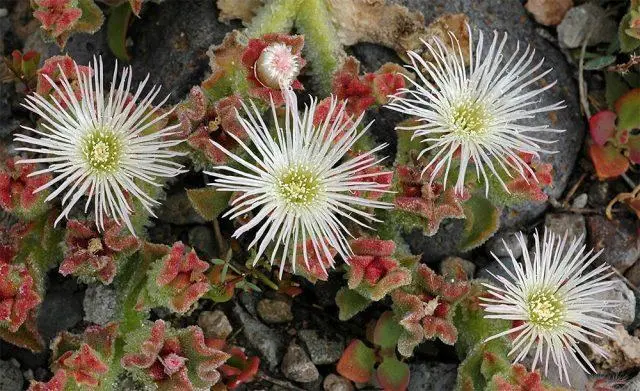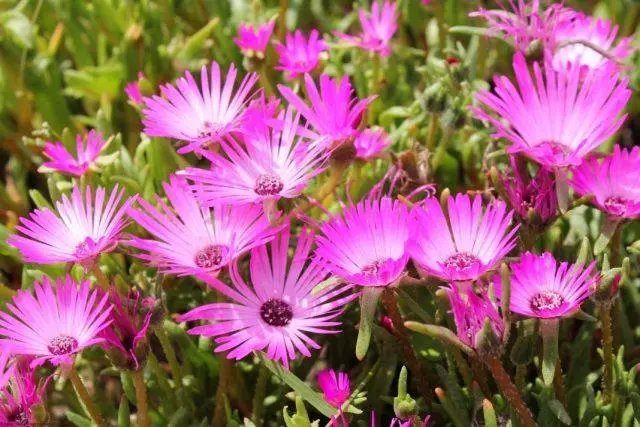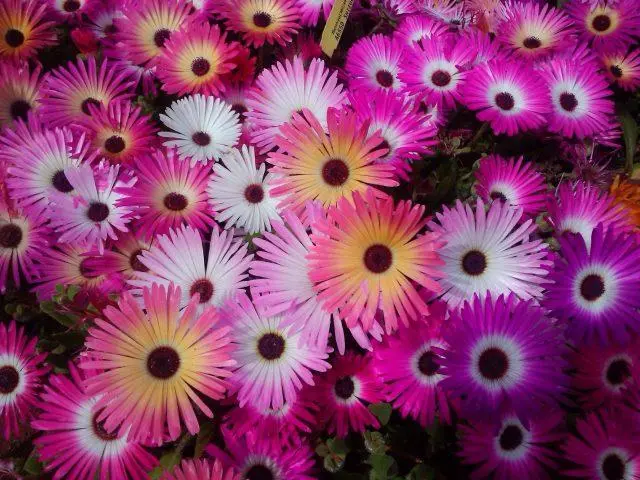Contents
- Description of the mesembryanthemum
- Species and varieties
- What does mesembryanthemum seedling look like?
- Growing seedlings of mesembryanthemum from seeds at home
- Planting and caring for mesembryanthemum in the open field
- Methods of reproduction
- Diseases and pests
- Mesembryanthemum in a flower bed
- Conclusion
- Reviews about mesembryanthemum
A photo and description of mesembryanthemum (mesembryanthemum) will help flower growers get to know this interesting plant better, which can be grown not only in open ground in a flower bed, but also in containers and pots on the balcony. It is a drought-resistant, undersized, creeping crop that blooms throughout the summer with large chamomile-like buds. In particular, it is an annual, but there are also biennial varieties.
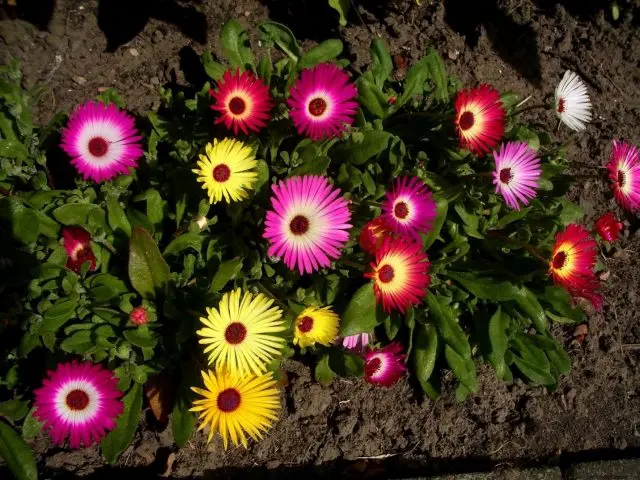
Mesembryanthemum refers to succulent plants that store water in the aerial part.
Description of the mesembryanthemum
Crystal daisy (the second name of the flower) is a succulent native to South Africa. Belongs to the Aiz family. It has green leaves, arranged in an opposite pattern at the bottom of the stems and alternately at their tops. Usually they are rosette, rounded, fleshy, on their surface there are small growths that look like dew drops, which is why the mesembryanthemum is often called crystal or glass. The shoots of the plant are thick, but fragile, long, can stretch up to 80 cm. Flowers like chamomile, usually large, abundantly cover the plant throughout the summer and until mid-autumn. Their petals are narrow, numerous, varied in color: white, yellow, pink, cream, purple, there are two-color varieties. After flowering, in their place fruits-boxes are formed, in the chambers of which small seeds ripen.
Mesembryanthemum height
Crystal chamomile is a low-growing ground cover, the height of which is usually 10-15 cm. Almost all species die off after fruiting, although there are also perennial varieties.
Species and varieties
Mesembryanthemum includes a large number of species that have not yet been studied in full. Most often in gardening there is a crystal chamomile heart-leaved (cordifolium), or rather its hybrids.
The most popular varieties of culture are:
- Crystal mesembryanthemum (crystallinum) – a species no more than 15 cm high, with sprawling stems and flowers very similar to chamomile. The leaf plates of the plant are pale green in color, with wavy edges, heavily covered with papillae. Buds can be red, pink, purple or white. From the varieties of this species, the mesembryantemum of the Sparkle is distinguished with flowers of various colors and white-yellow leaf blades, Harlequin – it is distinguished by bright colors and the ability to grow up to 0,5 m, Limpopo – represents sprawling bushes with large delicate flowers.

Inflorescences of crystal mesembryanthemum three-flowered
- Cereal mesembryanthemum (tricolor) – a species about 12 cm high, with a spreading structure and beautiful stems that form a carpet. Pink buds with a dark center.

The leaf plates of the cereal mesembryanthemum are completely covered with hairs.
- Crystal daisy daisy species (bellidiformis) – undersized (up to 10 cm) annual with gray-green leaves and reddish stems. Buds can be orange, red, purple, pink, white. They bloom only in the sun.

Daisy mesembryanthemum forms a dense carpet on the ground
What does mesembryanthemum seedling look like?
Seedlings of crystal chamomile, despite dense green leaves, are quite tender, with a branched root system, which even at a young age grows strongly in breadth, which is why the plant does not particularly like transplants. When planting it with seeds, it is advisable to immediately sow several pieces in one container in order to avoid picking and damaging the seedlings.
Growing seedlings of mesembryanthemum from seeds at home
There is an opinion among gardeners that it is easier and more convenient to grow mesembryanthemum through seedlings. The seeds of the culture are distinguished by good germination, and if the work is done correctly, then quite a lot of seedlings can be obtained.
When to sow mesembryanthemum for seedlings
Planting crystal chamomile seeds is carried out in early spring, usually in March or in the first half of April. At the same time, the climate of the growing region is taken into account. The earlier stable heat arrives, the earlier sowing is done.
Sowing mesembryanthemum seeds for seedlings
Crystal chamomile seeds are planted according to the following algorithm:
- Prepared containers are covered with a wet mixture of sand and earth in a ratio of 2/1.
- Perform surface sowing of seeds.
- Cover the containers with glass or film and leave in a room with a temperature of +12-15 °C.
- After a couple of weeks, when friendly shoots appear, the containers are placed in a room with a temperature of +10 ° C, the shelter is removed.
- After a couple of weeks, if necessary, a pick is carried out.
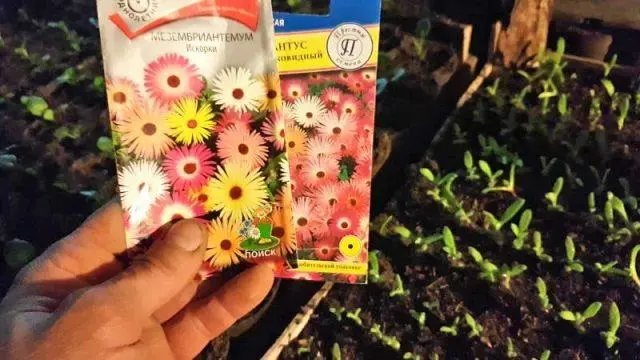
Mesembryanthemum seeds are very small, it is not necessary to plant them in the ground when planting.
Mesembryanthemum seedling care
Care for young seedlings of the mesembryanthemum is generally accepted. Seedlings after germination are opened, placed on a sunny windowsill, moistened as the earth dries.
Planting and caring for mesembryanthemum in the open field
Growing mesembryanthemum in the open field does not cause much trouble for flower growers. Planting is carried out as soon as the threat of return frosts has passed, from about mid-May. A place for it is chosen on the south side of the site, it should be well lit, ventilated, but without drafts. The soil should be rocky or sandy, with a drainage layer of expanded clay or sand.
The scheme for planting a crystal chamomile is as follows:
- In the prepared bed, dig planting holes at a distance of 15 cm from each other.
- Place seedlings in the holes.
- Cover the plants with loose soil.
- Compact the soil.
- Water.
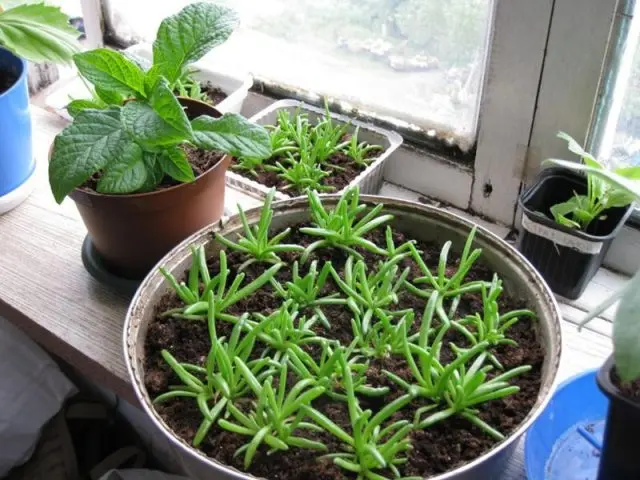
When growing two-year varieties of mesembryanthemum, they are left to winter in pots.
Watering
Mesembryanthemum needs moderate, but timely moistening of the soil with warm water, and in wet weather it is recommended to cover the crystal chamomile with a film to prevent the earth from becoming dehydrated. With moderate rainfall, watering is excluded, in winter moistening is carried out after the leaves are compressed, and in pots when the soil dries out.
Additional fertilizing
Crystal chamomile does not particularly bloom in fertile soil, so it does not need top dressing. But if we are talking about a plant that is grown as a potted crop, then in this case it will need fertilizers, and they need to be applied often, every 15-20 days. It is best to use special compositions for succulents.
Wintering
Mesembryanthemum is one of the non-frost-resistant ornamental crops, which is why it is grown as an annual in Our Country. But it is worth noting that if you dig up the bushes, plant them in containers and leave them for the winter in a cool room (glazed loggia or veranda), then they will winter well.
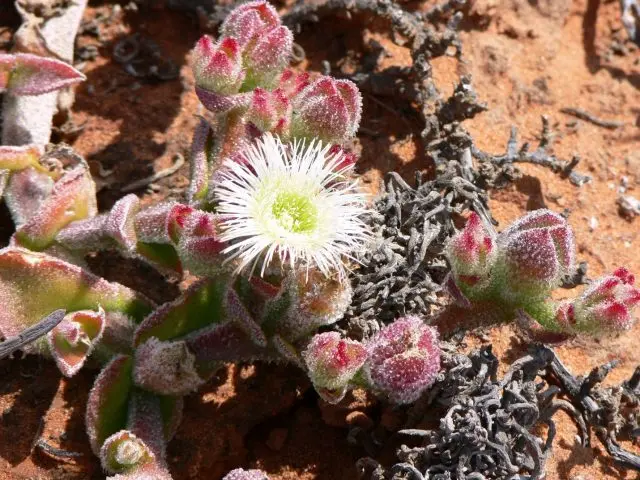
Mesembryanthemum should winter in a room where the temperature is kept at +8 ° C
Methods of reproduction
Most often, crystal chamomile is propagated by seeds, which can be collected independently. They are usually sown at home, less often immediately in flower beds. Dive mesembryanthemum begin in the spring, with the advent of sustained heat.
Some gardeners propagate mesembryanthemum cuttings. This is usually done in autumn, but sometimes in early spring, using strong shoots and rooting them in water, sand or soil for at least two weeks.
Diseases and pests
Mesembryanthemum is characterized by strong immunity and practically does not get sick, but on too wet soil or poorly drained areas it can rot.
Of the pests, the danger for the mesembryanthemum is the spider mite. When it is detected, all plants must be immediately treated with special means such as Aktara or Actellik.
Mesembryanthemum in a flower bed
Crystal chamomile flower, judging by the photo, looks great in the garden with different plants. It looks especially beautiful in rocky flower beds, on sunny alpine hills or slopes, where its long shoots hang spectacularly and crawl along the ground. Mesembreantemum grows well, due to which it looks decorative as an independent plant, but it also combines well with other flowering crops. Often it can be found in the same flower bed with drotheanthus and purslane, which are excellent companions for it.
The long period of mesembreantemum budding and low shoots make it possible to grow it in high and hanging pots, balcony boxes. The flower will be the perfect solution for a terrace or veranda.
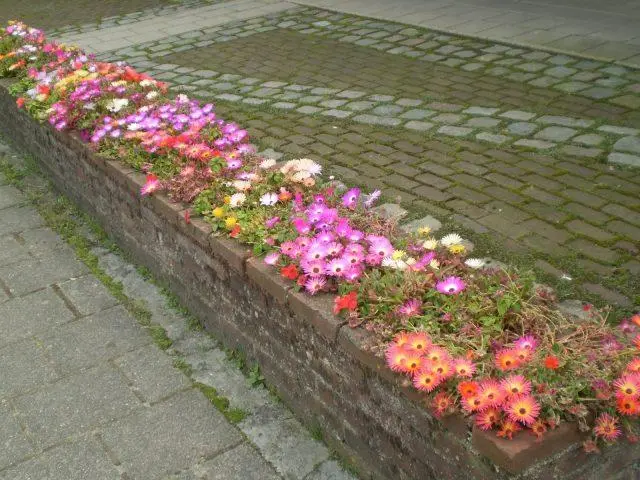
Crystal chamomile gets an additional decorative effect due to the overflow of colors.
Conclusion
The photo and description of the mesembryanthemum indicate that the plant is quite attractive, does not require special efforts when planting and caring for it. It has an unusual appearance, for which the people called it “crystal daisy”. Recently, the culture has begun to rapidly gain popularity among gardeners, although not many flower lovers knew about its existence a few years ago.










